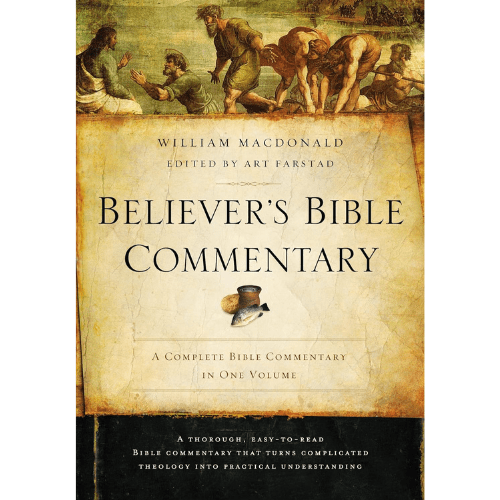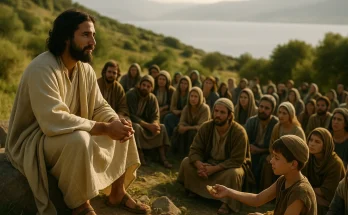Have you ever wondered if anything in life truly lasts? We chase success, build wealth, and seek pleasure, yet everything eventually fades. The Book of Ecclesiastes confronts this reality head-on, forcing us to consider what truly matters.
Written with deep reflection, this book explores the fleeting nature of human pursuits. The Teacher, traditionally believed to be Solomon, declares that everything under the sun is “meaningless” (Eccl. 1:2). He examines wisdom, work, pleasure, and wealth, only to find them temporary and unsatisfying. Yet, despite its sobering tone, Ecclesiastes is not a book of despair. Instead, it points us beyond the temporary to the eternal.
Throughout its pages, we are reminded that time is in God’s hands. There is a season for everything (Eccl. 3:1), but only God’s purposes endure. While we cannot control time, we can live with wisdom by fearing God and keeping His commandments (Eccl. 12:13).
The Book of Ecclesiastes urges us to shift our focus from what fades to what lasts. It invites us to seek meaning beyond this world, anchoring ourselves in the eternal. Ultimately, it reminds us that while life is short, God’s plans stand forever.
Writer of the Book of Ecclesiastes
The Book of Ecclesiastes has long been attributed to King Solomon, the son of David. In the opening verse, the author identifies himself as “the Teacher, son of David, king in Jerusalem” (Eccl. 1:1). Since Solomon was known for his unmatched wisdom, great wealth, and vast experiences, he fits this description well.
Throughout the book, we see reflections of Solomon’s life. He pursued knowledge, wealth, and pleasure, yet found them ultimately unsatisfying. His vast building projects, political power, and indulgent lifestyle align with the experiences described in Ecclesiastes. However, some scholars argue that the book was written later by an unknown author using Solomon’s perspective.
📖 Explore the Old Testament from start to finish with this easy-to-follow study guide! 🔍 Grow in faith and understanding—get your copy today!✨
Regardless of the writer’s exact identity, the Book of Ecclesiastes speaks with the voice of someone who has seen and done it all. The author’s wisdom is undeniable, offering timeless insights into human nature. More importantly, his reflections remind us that no earthly achievement brings lasting fulfillment. Instead, he points us toward a deeper purpose—fearing God and keeping His commandments.
Whether Solomon or another wise teacher penned these words, the message remains the same. Life’s meaning isn’t found in earthly pursuits but in trusting God’s eternal plan.
Date Written
If Solomon wrote the Book of Ecclesiastes, it was likely completed around 935 B.C., near the end of his reign. By this time, he had experienced incredible wealth, wisdom, and power, yet he may have reflected on how temporary these things were. His later years provide the perfect setting for the book’s deep and contemplative tone.
However, some scholars suggest a later date, possibly between the 5th and 3rd centuries B.C. They argue that the book’s language shows post-exilic Hebrew influences. While this is debated, it does not necessarily disprove Solomon’s authorship. It is possible that later scribes refined the text while preserving its original message.
Regardless of when it was written, the Book of Ecclesiastes remains timeless. It speaks to every generation, reminding us that earthly pursuits are temporary, but only God’s eternal purpose gives life true meaning.
To Whom Written
The Book of Ecclesiastes was originally written for the Israelites, but its message reaches far beyond them. It speaks to anyone searching for meaning in life. Whether we are rich or poor, wise or foolish, we all face the same questions about purpose, success, and fulfillment.
Many of us chase after wealth, pleasure, or knowledge, believing these things will satisfy us. Yet, Ecclesiastes reminds us that earthly pursuits are temporary. No matter our status, we all experience the same struggles, joys, and uncertainties.
Ultimately, the Book of Ecclesiastes serves as a reflection on human existence. It challenges every generation to look beyond the temporary and seek what truly lasts. The author’s words are just as relevant today as they were when first written. We all need the reminder that life apart from God is meaningless, but with Him, we find true purpose.
Purpose of the Book of Ecclesiastes
The Book of Ecclesiastes challenges us to see the temporary nature of life and seek true fulfillment in God. The author, often believed to be Solomon, explores work, pleasure, wisdom, and wealth, only to find them meaningless when pursued apart from God. Over and over, he reminds us that everything “under the sun” is fleeting (Eccl. 1:3).
At first, Ecclesiastes may seem discouraging, but its purpose is not to leave us hopeless. Instead, it forces us to confront life’s realities and ask deeper questions. What truly lasts? What gives life meaning? The book leads us to one conclusion—only God provides lasting purpose.
Ultimately, the Book of Ecclesiastes urges us to fear God and obey His commands (Eccl. 12:13). When we focus on Him rather than temporary pursuits, we find the purpose our souls long for. Everything else fades, but God’s truth remains forever.
Believer’s Bible Commentary
Make Bible study a part of your daily life with the thorough yet easy-to-read commentary that turns complicated theology into practical understanding.
Historical Context of the Book of Ecclesiastes
The Book of Ecclesiastes was likely written during a time of great prosperity, possibly during King Solomon’s reign. Israel had reached its peak in wealth, power, and influence. The nation enjoyed peace, and its economy flourished. However, with prosperity came a shift in focus—many turned to material success instead of spiritual devotion.
Solomon himself experienced this firsthand. He accumulated vast wealth, built grand structures, and sought wisdom, yet he drifted from full devotion to God (1 Kings 10–11). His personal journey mirrors the book’s message—earthly pursuits, no matter how grand, ultimately fail to satisfy.
If Ecclesiastes was written later, it may have reflected Israel’s struggles after exile. The nation had seen its glory fade, serving as a sobering reminder that human achievements are temporary. Regardless of the time period, the Book of Ecclesiastes speaks to all generations, reminding us that life without God is ultimately empty.
Key Themes in the Book of Ecclesiastes
The Book of Ecclesiastes explores deep questions about life, purpose, and eternity. Through its wisdom, we learn that worldly success is fleeting, but God’s truth remains. Let’s explore some key themes.
The Vanity of Life
Everything in life is temporary. Wealth, pleasure, and wisdom may seem fulfilling, but they ultimately fade (Eccl. 1:2; 2:11). No matter how much we achieve, we cannot escape life’s uncertainties. The author repeatedly reminds us that chasing after worldly things is like “chasing the wind.”
The Sovereignty of God
God is in control, and nothing we do can alter His eternal plans (Eccl. 3:14). While we may strive for control, only He knows the full picture. This truth reminds us to trust Him rather than depend on our own efforts.
Time and Eternity
The famous passage in Ecclesiastes 3:1-8 teaches that everything has a season. Life moves through cycles of joy and sorrow, gain and loss. Yet, only God understands the full purpose of time, guiding events according to His perfect plan.
The Limits of Human Wisdom
No matter how much knowledge we gain, true understanding comes only from God (Eccl. 8:16-17). Human wisdom has limits, and many questions remain unanswered. Ecclesiastes encourages us to seek God’s wisdom rather than rely solely on our own understanding.
The Fear of God
Ultimately, the Book of Ecclesiastes concludes that fearing God and obeying His commands is life’s greatest purpose (Eccl. 12:13-14). While everything else fades, our relationship with God remains. In the end, only He gives life true meaning.
Major Events/Stories in the Book of Ecclesiastes
Although the Book of Ecclesiastes is not a traditional narrative, it contains powerful reflections on life, purpose, and eternity. Through key passages, the author shares deep insights that challenge us to think beyond earthly pursuits.
Solomon’s Search for Meaning
The author, traditionally believed to be Solomon, describes his pursuit of wisdom, pleasure, work, and riches (Eccl. 2). He explores everything life offers—luxury, success, and knowledge—only to find it ultimately meaningless. Despite achieving more than most, he realizes that nothing under the sun brings lasting satisfaction. This reflection forces us to consider where we seek fulfillment.
The Poem on Time
One of the most well-known passages in the Book of Ecclesiastes is found in Ecclesiastes 3:1-8. It reminds us that “there is a time for everything” and that life moves through seasons. Joy and sorrow, gain and loss, birth and death—all happen in God’s timing. While we cannot control time, we can trust God’s perfect plan.
Observations on Work
The author reflects on the nature of work, realizing that labor often benefits others more than the one who toils (Eccl. 2:18-26). No matter how much we build or achieve, we cannot take it with us. This forces us to ask: what truly lasts?
Reflections on Death
Ecclesiastes confronts the reality of death, stating that both the wise and the foolish share the same fate (Eccl. 9:1-6). This sobering truth leads to a clear conclusion—fearing God is what truly matters. Ultimately, the Book of Ecclesiastes urges us to look beyond the temporary and seek what is eternal.
Theological Contributions of the Book of Ecclesiastes
The Book of Ecclesiastes challenges us to wrestle with life’s biggest questions—why are we here, and what truly matters? Unlike Proverbs, which often highlights the rewards of wisdom, Ecclesiastes reminds us that life does not always follow predictable patterns. Sometimes, the righteous suffer while the wicked prosper (Eccl. 8:14). This truth forces us to rely on God rather than our own understanding.
Another key contribution is the book’s emphasis on human limitations. No matter how much wisdom we gain, we cannot fully grasp God’s purposes (Eccl. 11:5). Instead of chasing certainty, we are called to trust Him.
Ultimately, the Book of Ecclesiastes points us toward Christ. It reveals the emptiness of a life lived apart from God and the need for something greater. While everything “under the sun” fades, Jesus offers eternal fulfillment. In the end, fearing God and obeying Him is life’s greatest purpose (Eccl. 12:13).
Special Consideration in the Book of Ecclesiastes
The Book of Ecclesiastes presents a unique balance between skepticism and faith. At first glance, some passages seem cynical, even contradictory. The author repeatedly declares that everything is “meaningless,” yet he also urges us to fear God. This tension challenges us to think deeply about life’s purpose.
Although the book questions the value of earthly pursuits, it does not leave us hopeless. Instead, it directs us toward God as the only source of lasting fulfillment. Many scholars struggle with Ecclesiastes’ tone, but its message aligns with other wisdom literature. Like Proverbs and Job, it reminds us that life is unpredictable and beyond our full understanding.
Jesus Himself echoed its themes, warning against storing up treasures on earth (Matt. 6:19-21). He pointed us toward eternal priorities, just as Ecclesiastes does. Ultimately, the Book of Ecclesiastes calls us to look beyond temporary achievements and place our trust in God’s eternal plan.
Final Thoughts: Book of Ecclesiastes
The Book of Ecclesiastes delivers a powerful reminder that life without God is empty. No matter how much we achieve, everything under the sun fades. Wealth, pleasure, and success may satisfy for a moment, but they do not last.
Yet, Ecclesiastes is not a hopeless book. Instead, it points us to what truly matters—fearing God and keeping His commands (Eccl. 12:13). While time is fleeting, eternity is certain. We are not meant to chase after temporary things but to seek God’s eternal purpose.
Jesus echoes this message, reminding us that true treasure is found in God, not in earthly pursuits (Matt. 6:19-21). The Book of Ecclesiastes challenges us to shift our focus from what fades to what lasts forever. In Christ, we find the fulfillment that this world cannot provide. Only through Him do we secure a hope that transcends the temporary and leads to everlasting life.
Frequently Asked Questions (FAQ) Book of Ecclesiastes
1. What is the main message of the Book of Ecclesiastes? The Book of Ecclesiastes teaches that earthly pursuits—wealth, pleasure, and success—are ultimately meaningless without God. It reminds us that true purpose is found in fearing God and keeping His commandments (Eccl. 12:13).
2. Who wrote the Book of Ecclesiastes? Traditionally, King Solomon is believed to have written Ecclesiastes. He refers to himself as “the Teacher, son of David, king in Jerusalem” (Eccl. 1:1). However, some scholars suggest a later author writing from Solomon’s perspective.
3. Why does Ecclesiastes repeatedly say life is meaningless? The author emphasizes life’s temporary nature to show that nothing under the sun lasts. Without God, everything is fleeting, like “chasing the wind” (Eccl. 1:14).
4. What does Ecclesiastes teach about time and eternity? Ecclesiastes 3:1-8 teaches that everything has a season. While time is beyond our control, God’s purposes remain eternal and unchanging.
5. How does the Book of Ecclesiastes connect to Jesus? Jesus echoes Ecclesiastes’ themes by warning against earthly treasures (Matt. 6:19-21). He offers the lasting fulfillment that the book longs for.




